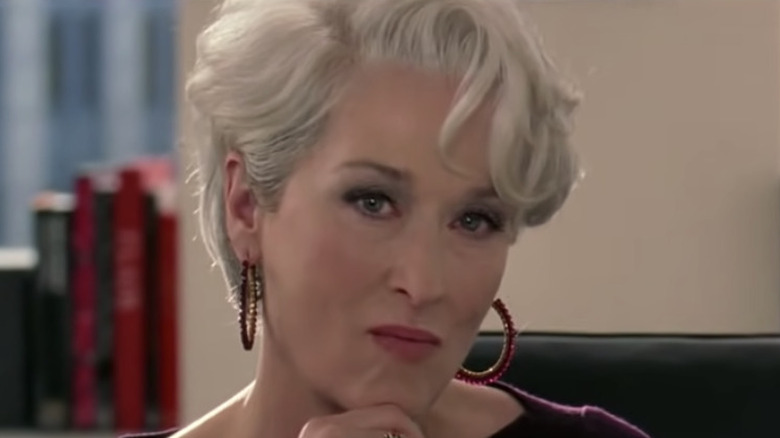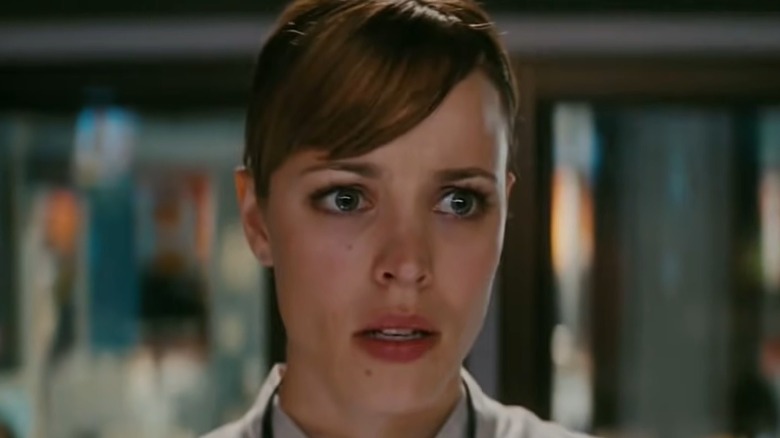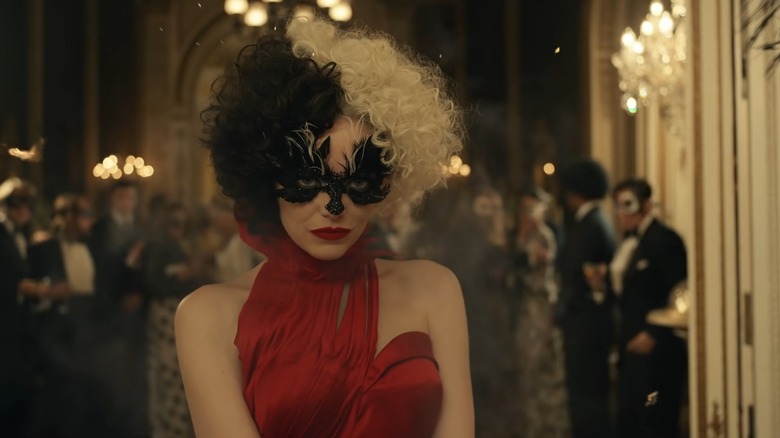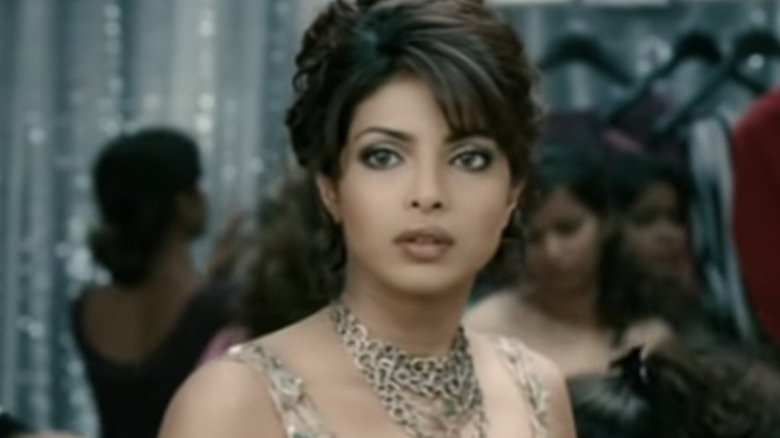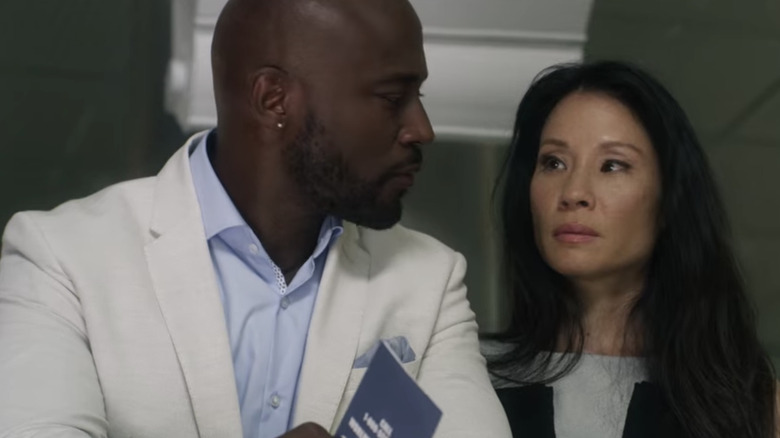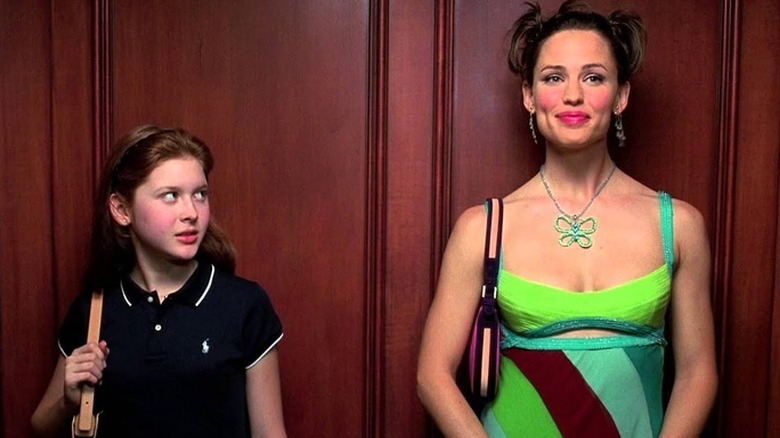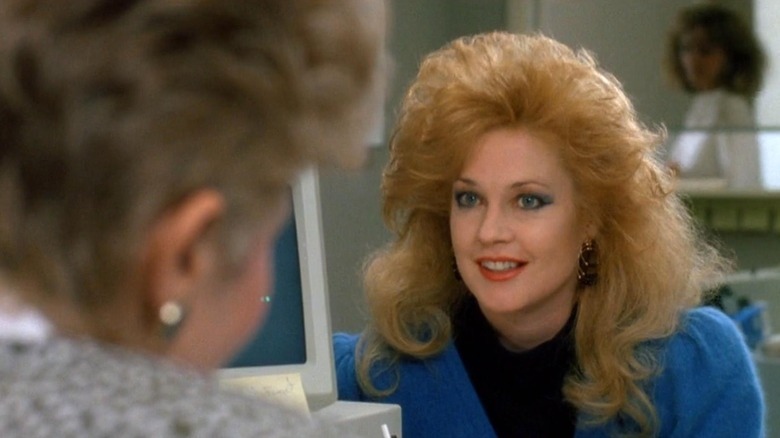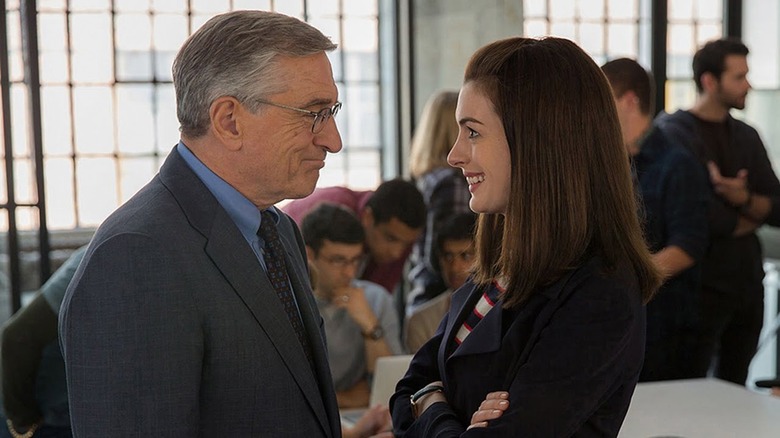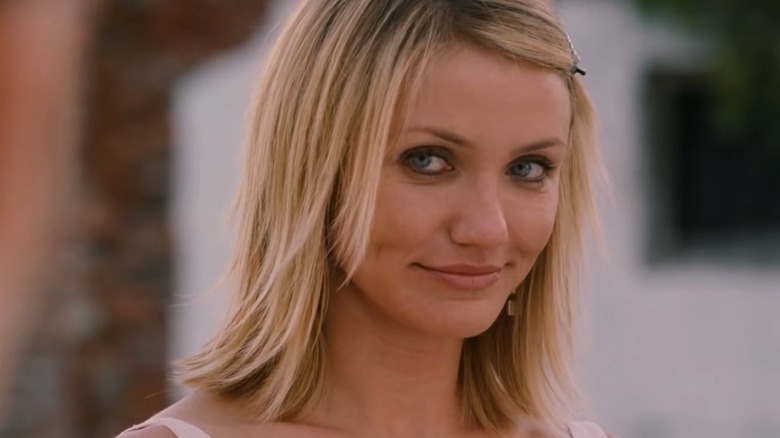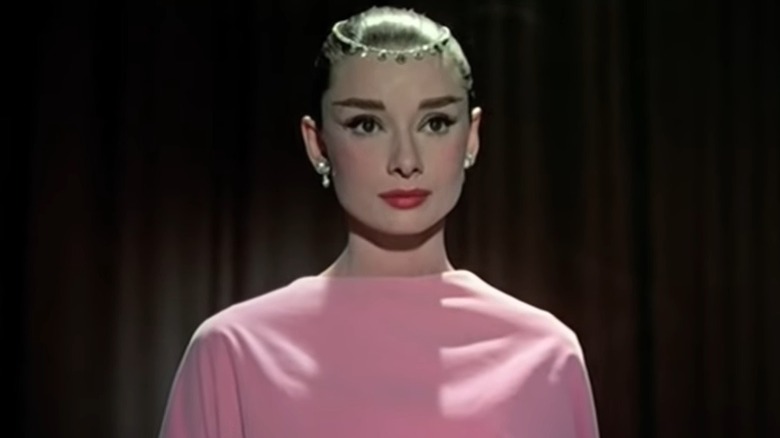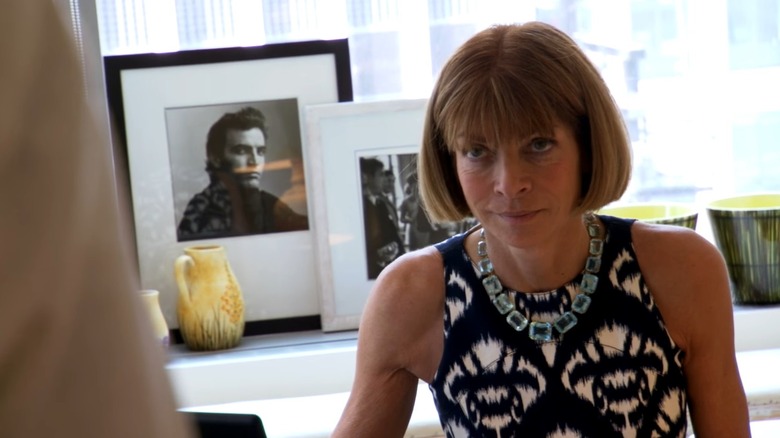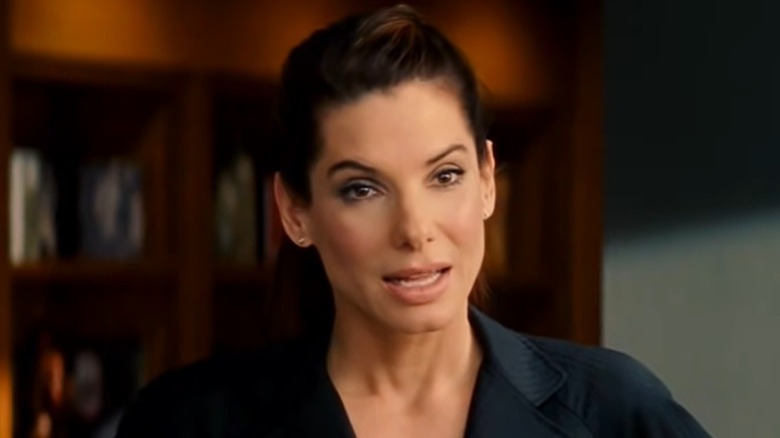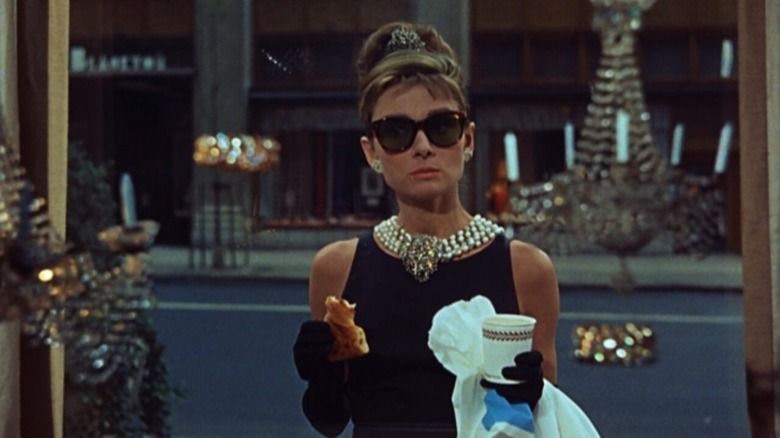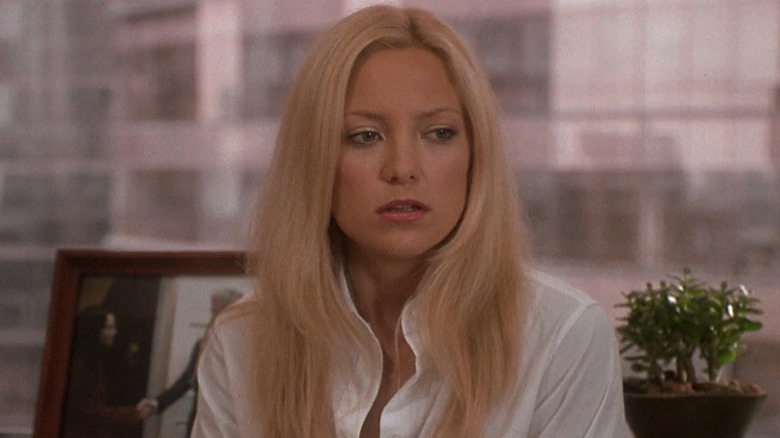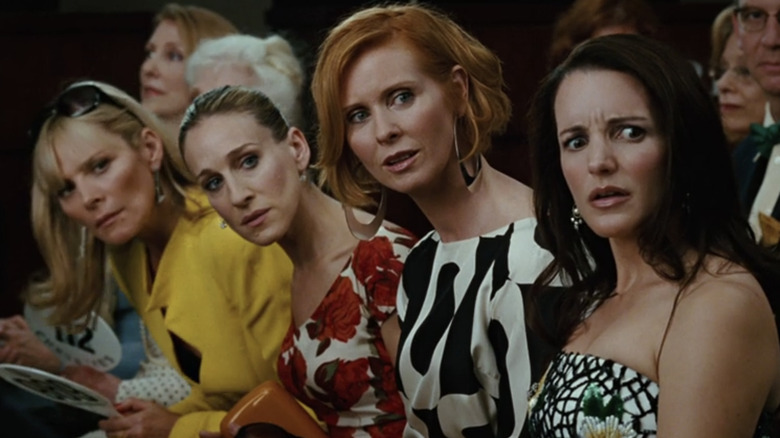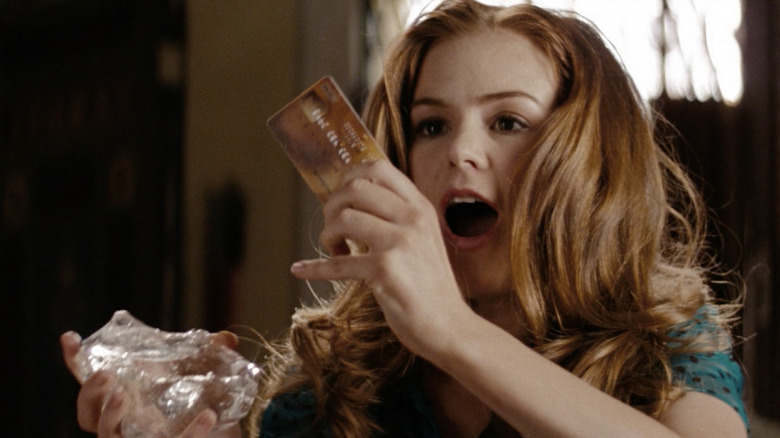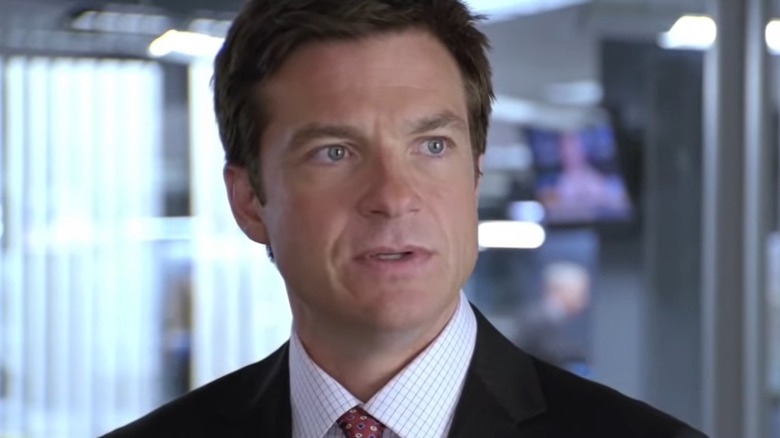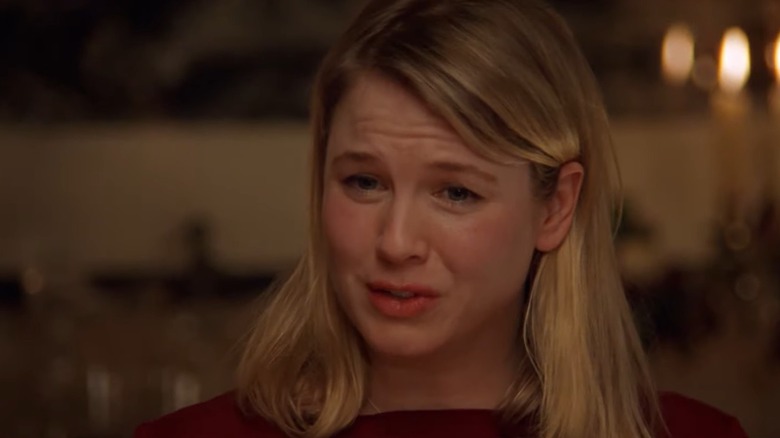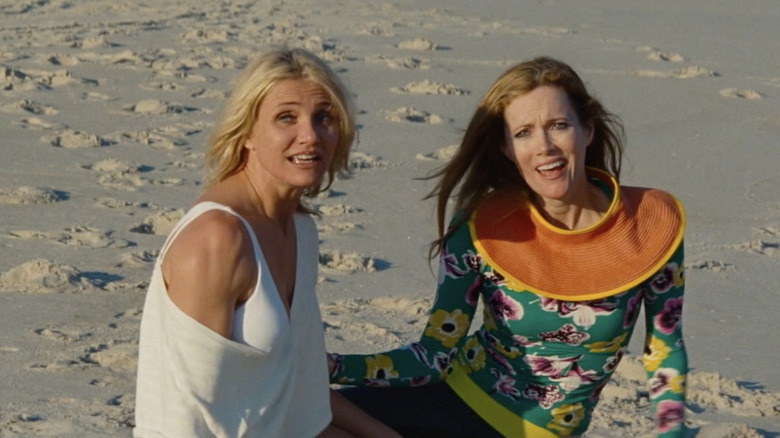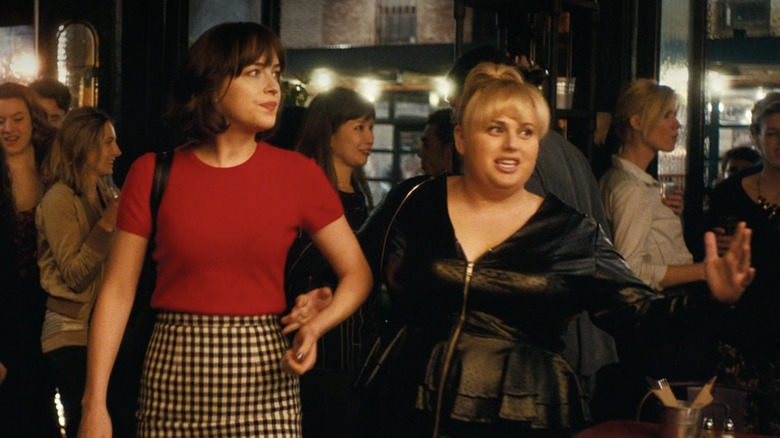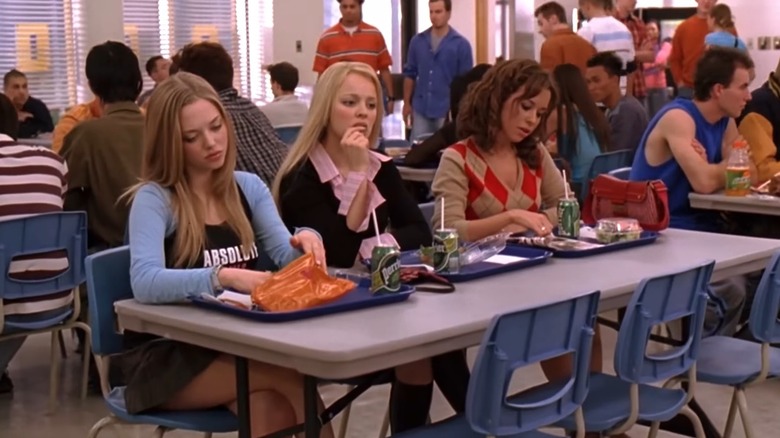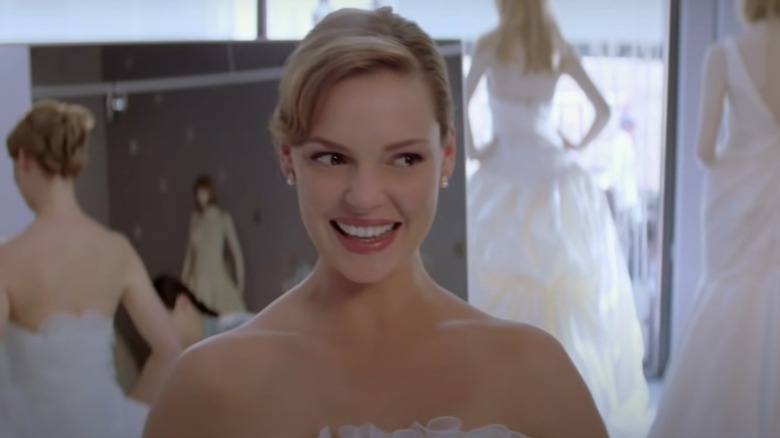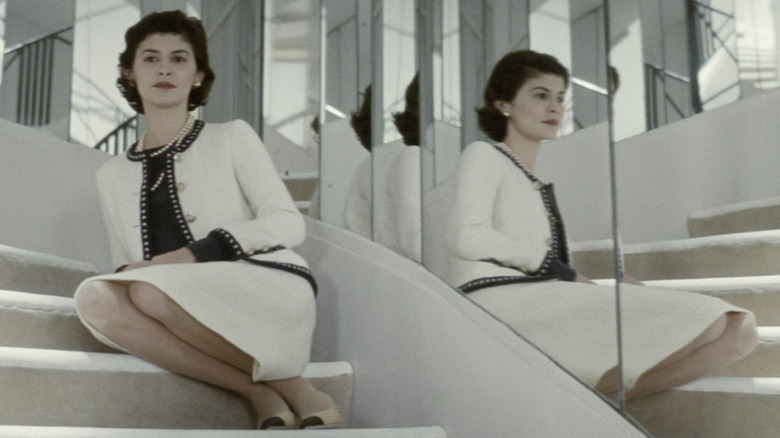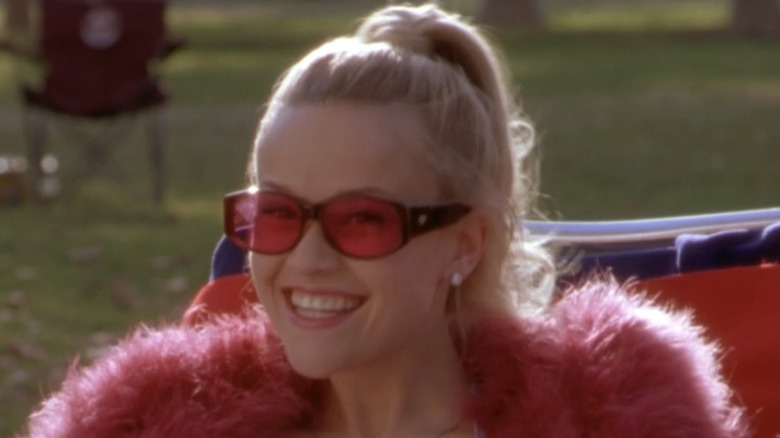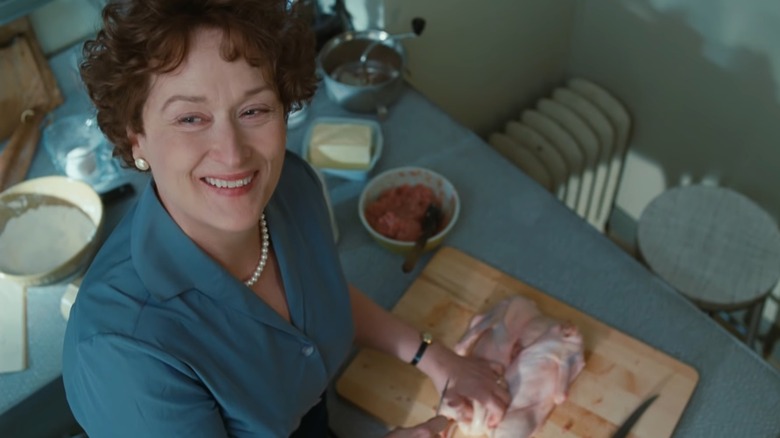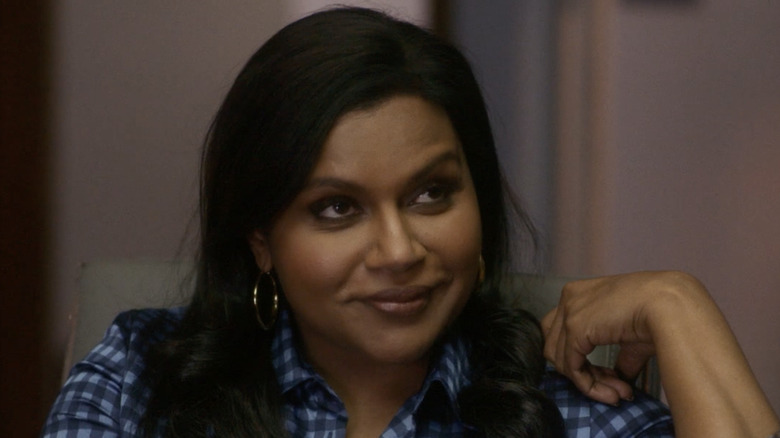25 Movies Like The Devil Wears Prada You Should Watch Next
"The Devil Wears Prada" is a hilarious satirical comedy about the cut-throat world of fashion. Anne Hathaway stars as Andy Sachs, a plucky aspiring journalist, who lands a dream job at the fictional fashion magazine "Runway." Andy has a wonderful fresh-faced naïveté — and questionable fashion choices — but quickly faces major opposition in the form of the acerbic, silver-tongued, and silver-haired editor-in-chief, Miranda Priestly (Meryl Streep).
With the help of a supporting cast that includes Emily Blunt, Stanley Tucci, and Adrian Grenier, "The Devil Wears Prada" offers a sharp and sassy exposé of fashion and journalism that features a host of memorable moments, including Miranda's scathing takedown of Andy's cerulean jumper that puts her dismissive attitude towards the nuances of fashion right in its place.
While "The Devil Wears Prada" does show the glamor of the catwalk and swanky showbiz parties, it also gives a warts-and-all picture of the much less glamorous side of fashion, as Miranda's frequent demands range from the mundane — such as Andy picking up her coffee — to the downright ludicrous — such as locating the unpublished manuscripts for the latest "Harry Potter" book. Through Andy — and the magnificent Emily Blunt as the forthright Emily — anyone who has ever had an insufferable boss will be able to relate to the wavering between complete despair of a thankless job and the desire to forge a successful career.
Whether you're after more female-led comedies, films about fashion, or exceptional love-to-hate characters like Miranda Priestly, we've got you covered with some great films to watch if you loved "The Devil Wears Prada."
Morning Glory
An under-seen but enjoyable rom-com, "Morning Glory" has a similar story to "The Devil Wears Prada" but focuses instead on the surprisingly catty world of national news. Rachel McAdams stars as Becky Fuller, a newly hired producer for the morning news show, "Daybreak." In a bid to improve the ratings, she brings in veteran anchorman Mike Pomeroy (Harrison Ford). However, he has a very different style from his co-host Collen Peck (Diane Keaton), and the pair frequently clash.
"Morning Glory" provides tremendous fun in the scenes of Keaton and Ford sparring and bickering like an old married couple. The film is further bolstered by Rachel McAdams' effervescent energy, which provides the perfect balance, as she tries to manage the complicated office politics and large egos associated with broadcast news. In a similar way to Andy in "The Devil Wears Prada," Becky's dedication to her job borders on obsession, and it begins to interfere with her personal life and affect her new relationship with fellow producer Adam (Patrick Wilson).
Besides great performances from their stars, "Morning Glory" and "The Devil Wears Prada" also boast strong and sharp scripts. Perhaps that's not surprising, as both films were written by Aline Brosh McKenna. While the critical response was mixed, "Morning Glory" is still an entertaining film, and it is particularly fun to see Harrison Ford in an altogether "fluffier" role.
Cruella
When it was announced that the latest villain to receive the live-action origin story treatment was the maniacal, dog-napping Cruella de Vil from "101 Dalmatians," the focus turned to just how the film would find sympathy for this charismatic, wicked, and undeniably cruel villain. 2021's "Cruella" surprised and delighted in the most unexpected ways, showing us a young Cruella (Emma Stone) — at this point going by the name of Estella — as an aspiring fashion designer trying to make a name for herself in a punky '70s London.
With the focus on fashion, and with the writing team including "The Devil Wears Prada's" Aline Brosh McKenna, it isn't hard to see some of the crossovers between these two films. The real fun begins when Estella accepts a job working at the fashion house of the delectably named Baroness von Hellman's (Emma Thompson). Thompson clearly channels her inner Miranda Priestly here when she clashes with the up-and-coming designer, and as The Guardian's film critic Peter Bradshaw wryly observed, "Cruella" could be called "The De Vil wears Prada."
While the film doesn't fit in perfectly with the continuity of the original animated film, it does instead offer an interesting, alternative origin story for the iconic villain. With both Emmas at the top of their game, the best moments of "Cruella" are the ones where they're on screen together, competing with scenery-chewing wit and high-stakes fashion one-upmanship. It's no surprise that their outstanding costumes nabbed an Oscar for the film.
Fashion
While a little more serious in tone than "The Devil Wears Prada," the 2008 Indian film "Fashion" focuses on an equally career-driven woman, as she tries to make it big in the high-stakes world of fashion. Priyanka Chopra Jonas stars as Meghna Mathur, a girl from a small town, who defies her family's wishes for her to become an accountant and instead, leaves for the big city to become a supermodel. In a similar way to Andy, who has dreams of becoming a journalist, Meghna is hugely passionate about making it in fashion and proving her naysayers wrong.
"Fashion" goes down the route of drama more so than comedy, as it examines the competitiveness in the modeling world as well as its darker, seedier, and more dangerous aspects. Additionally, Meghna and other models struggle to balance their career aspirations, while maintaining dignity and not doing anything that would dishonor their families.
Although it doesn't shy away from the hardships and the flip side of where ambition can take you, there is still plenty of glitz and glamor in "Fashion." The photoshoots, catwalks, and shows are all full of vivid color and spectacle. In the end, the film's focus on the relationships between the models and how they navigate this world together helps it find a surprisingly emotional layer beneath the superficial glamor.
Set It Up
While Meryl Streep gives a scene-stealing performance as Miranda Priestly, the main focus of "The Devil Wears Prada" is still on those working beneath her, as they struggle to cope with her ruthless attitude. Similarly, the 2018 comedy "Set It Up" hones in on assistants Harper (Zoey Deutch) and Charlie (Glen Powell), who bond over being overworked by their respective nightmare bosses, Kirsten (Lucy Liu) and Rick (Taye Diggs). When they realize it would work to their mutual advantage if they could set up their bosses romantically, the pair hatch a plan to get them to fall in love.
Since Harper and Charlie know their bosses better than anyone, they're the perfect people not only to orchestrate the meet-cute, but also to keep up the scheme by intervening and manipulating Kirsten and Rick to stay together. While tricking two people to fall in love is perhaps a bit questionable, "Set It Up" thrives on us being in on the joke as well, as we know it is only a matter of time before it all goes wrong.
Both Lucy Liu and Taye Diggs are in fine form as the overbearing bosses, and Zoey Deutch and Glen Powell have a sparky rapport that keeps the tone of the film light and fun. There is a sense of predictability to "Set It Up" — particularly as we see Harper and Charlie grow closer together as well — but it's part of the rom-com charm. "Set It Up" is an easy, funny watch, with a sweet message of finding love when you least expect it.
13 Going on 30
Andy in "The Devil Wears Prada" has to work hard to climb the ladder in her career. However, in "13 Going on 30," Jenna Rink gets on a (very) fast track to her dream fashion job. 13-year-old Jenna (Christa B. Allen) pores over the pages of her favorite publication, Poise, where she admires the glamorous models and wishes that she could be one of the people working with them. Young Jenna makes a birthday wish to be "thirty, flirty, and thriving," and it comes true: She wakes up the next day in the body of her 30-year-old self (played by Jennifer Garner).
While processing the shock of being magically aged up by 17 years, Jenna is even more surprised to learn that she's landed her dream job at Poise. Working alongside her is her former bully, Lucy "Tom-Tom" Wyman (Judy Greer), and while they are now friends, tensions arise when they work on competing rebrand designs.
As well as providing a fun twist on the body-swap comedy, "13 Going on 30" also takes a swipe at the often ruthless world of fashion journalism. But the film goes beyond its fashion elements to show Jenna navigating a relationship with former best friend Matt (Mark Ruffalo), the pressures that come with being an adult, and the realization that perhaps wishing her life away wasn't the best thing to do. At the heart of this endearing rom-com is the idea that "the dream" isn't always as perfect as it seems, and the true path to happiness can lie in appreciating what is already in front of you.
Working Girl
In this classic '80s rom-com, Melanie Griffiths plays the ambitious secretary Tess McGill who — after being undercut by her conniving boss Katharine Parker (Sigourney Weaver) — decides to pretend to be her boss to secure a major deal with investment broker Jack Trainer (Harrison Ford). Much like "The Devil Wears Prada," this film perfectly captures that feeling of being over-worked and under-appreciated by your boss, and in the case of "Working Girl," there is further cause for animosity, as Katharine takes credit for an idea Tess came up with.
With big hair and big ideas, Melanie Griffiths' energetic and unpredictable performance brings the perfect balance to Sigourney Weaver's smiling treachery. Together, the pair have a believable and complex dynamic. In terms of romantic chemistry, Harrison Ford is at the peak of his suave, smooth-talking powers, and is the perfect love interest. Given that Tess begins dating him when she is posing as her boss, it increases the stakes when she is inevitably caught.
There are plenty of duplicities and double-crossings in this entertaining film, but through the character of Tess, there is also a wonderful sense of optimism, as we really want to root for the plucky underdog to succeed and climb her way to the top of the corporate ladder. "Working Girl" proved to be a hit with the critics, and it was nominated for six Academy Awards, including Best Actress, Best Picture, and Best Director, and won one for Best Original Song for Carly Simon's "Let The River Run."
The Intern
In a fun role reversal from her part in "The Devil Wears Prada," Anne Hathaway gets to play the boss in "The Intern." In this film, she's Jules Ostin, CEO of a fashion company, who hires 70-year-old intern Ben Whittaker (Robert DeNiro) as part of a community outreach initiative to get older people into workplaces to share their invaluable life experience. While it seems like an unlikely pairing, there is a surprising sweetness to the relationship that forms between Jules and Ben. He helps her to find balance and calm in life, while she encourages him to find a sense of purpose following the death of his wife.
DeNiro may be known for his violent dramas such as "Goodfellas" and "Taxi Driver," but we get to see a much softer side to him in "The Intern." The "elder statesman" approach he brings to the film is perfectly in keeping with the character he plays. There's a sparkle to his eyes, which we see in the touching romance he forms with massage therapist Fiona (Rene Russo) and in the way he thoughtfully advises his younger co-workers.
"The Intern" got mixed reviews, as some critics praised the performances of Hathaway and DeNiro, but thought the film was lacking in depth. Peter Travers for Rolling Stone called it "pure fantasy piffle from writer-director Nancy Meyers," but noted that "De Niro makes it go down easy." The film did perform much better at the box office, however, as it made more than $194 million worldwide off a budget of just $35 million.
In Her Shoes
"In Her Shoes" is a 2005 dramedy based on the book by Jennifer Weiner, which focuses on two very different sisters and their relationship with their estranged grandmother. Rose (Toni Collette) is the career-focused and protective older sister to Maggie (Cameron Diaz), a wayward party girl, who struggles to hold down a job. When Maggie makes an irreversible mistake and sleeps with the guy Rose had been dating, a rift forms between them and drives Maggie to seek out the grandmother she didn't know existed in Florida.
In a similar way to "The Devil Wears Prada" — which is also based on a novel and hones in on the sometimes fractious relationships between women — "In Her Shoes" effectively establishes the relationship of its central characters, and gives a frank portrait of the bitterness and competitiveness that can arise between two conflicting personalities. Even though the sisters spend much of the film apart, this closeness that once existed between them feels tangible, and it makes the eventual resolution even more heartfelt and fulfilling.
As with all good dramedies, there is the sense that by the end, the two characters have learned something from each other. Rose opens herself up to romantic opportunities and embraces a freer outlook on life, while Maggie finally discovers a career and a purpose that she is passionate about. "In Her Shoes" was a surprise hit with critics, who praised its warmth and honesty. Liz Beardsworth for Empire called it "a simple yet rich drama played with humor and compassion and blessed with excellent performances."
Funny Face
In this classic 1957 musical rom-com, Audrey Hepburn stars as Jo Stockton, a bookstore clerk, who is discovered by Dick Avery (Fred Astaire) when his boss Maggie Prescott (Kay Thompson) sends him out to find fresh talent. While initially hesitant — and openly critical of the fashion world — Jo begins to fall for Dick and is whisked away to Paris to become the next big star.
Although they work on different sides of the camera, there are a lot of similarities between Jo and Andy in "The Devil Wears Prada." Both are skeptical about working in fashion, with Andy only taking the job at "Runway" in the hope that Miranda's recommendation will make it easier for her to get a more "serious" and desirable job in the future. Jo also has no desire to be a model and even though she agrees to go to Paris, she has ulterior motives and would much rather attend a philosophy lecture than a photoshoot.
With sparky chemistry between Astaire and Hepburn, plus exuberant musical numbers, "Funny Face" is a colorful, stylish, and light-hearted film that doesn't have the same bite as "The Devil Wears Prada" but still contains some satire about the superficiality of the fashion world. Audrey Hepburn is a vision and the film's Parisian backdrop gives an elegant, timeless feel. While not as lauded as Hepburn's later musicals such as "My Fair Lady," "Funny Face" still received positive reviews from critics including Bosley Crowther for The New York Times who called it "a delightfully balmy romance."
The September Issue
It is no secret that there are elements of truth to "The Devil Wears Prada," since the book's author Lauren Weisberger worked as an assistant to Anna Wintour, the legendary editor-in-chief of Vogue (via The Daily Mail). Weisberger used her experiences to inform the characters and situations in the novel to give people an inside look into the fashion world. "The September Issue" is a fascinating documentary about Wintour and the Vogue staff, which goes even deeper to give us a peek behind the curtain to see how the cerulean sweaters are made and how much truth there is to "The Devil Wears Prada."
As the documentary informs us, "September is the January in fashion," and the corresponding issue of Vogue is the biggest and most important one of the year. Not only does it mark the transitional period between seasons, but as Glamour editor-in-chief Samantha Barry noted to Fashionista, the fall fashion issues represent "a big reset moment for people."
Even if you only have a passing interest in fashion, "The September Issue" is an incredibly enjoyable documentary, and with Anna Wintour's icy cold exterior and power to make or break a designer, it isn't hard to see where the inspiration for Miranda Priestly came from. It is a distinctly starry affair as well, featuring a veritable feast of talent, including designers Karl Lagerfeld and Vera Wang, and models such as Coco Rocha and Lily Cole. Originally premiering at Sundance in 2009, "The September Issue" performed well with critics, including Ben Walters of Time Out, who called the film "consistently funny and engaging."
The Proposal
The stressed assistants in "The Devil Wears Prada" are pushed to their limits when it comes to the demands of their fearsome boss, Miranda Priestly. However, "The Proposal" takes it one step further in terms of going above and beyond for an employer. Ryan Reynolds plays Andrew, the assistant to the ambitious publishing house editor, Margaret (Sandra Bullock). When she learns that her visa application has been denied and she faces deportation to Canada, she fakes an engagement with Andrew so that she can stay in the country. Under the proviso that she will publish the book he has been writing, Andrew agrees to go along with it.
If rom-coms have taught us anything, it is that two people who pretend to be in love for any mutual advantage scenario will inevitably end up falling for each other. "The Proposal" may be predictable, but with two excellent performances from Sandra Bullock and Ryan Reynolds — plus a supporting appearance from the incomparable Betty White — there is plenty of fun to be had. From the initially awkward scenes of pretending to be in love, to the believable and warm chemistry between Bullock and Reynolds, "The Proposal" ends up being genuinely heartfelt.
While the big-name stars ensured the film was a box office success, "The Proposal" failed to win over critics, who felt it was burdened with clichés. Lou Lumenick for the New York Post called it "shamelessly derivative, contrived and predictable," while also admitting it is "a crowd-pleasing romantic comedy."
Breakfast At Tiffany's
While there is one very problematic character portrayal in "Breakfast At Tiffany's" that has aged like rotten milk, this iconic romantic comedy still remains both a highlight of screen legend Audrey Hepburn's career, as well as one of the defining moments of film fashion. Even if you're not familiar with the film, there's a good chance you know the image of Hepburn in her black Givenchy dress, adorned with pearls — one that has given us unrealistic expectations of how glamorous a hangover could look ever since.
In the film, Holly Golightly (Hepburn) is a sophisticated and elegant society girl, who has to reconcile with her past as an escort when she falls in love with the struggling writer and kept man, Paul Varjak (George Peppard). With Hepburn illuminating the screen, "Breakfast At Tiffany's" is a fun and frivolous romantic comedy. However, it is the influential fashion that the film is perhaps best known for, and according to Haute History, Hepburn's black dress is "among the most iconic images of 20th Century cinema."
The looks of "The Devil Wears Prada" may not have the longevity of those seen in "Breakfast at Tiffany's" but the role that fashion plays in both is absolutely essential. In "Breakfast At Tiffany's," this is seen both in the on-screen costumes and the prominence of the fashion world in the story, as Holly loves Tiffany's and all that the jewelry represents. Nominated for five Oscars, "Breakfast At Tiffany's" took home two awards for Original Song and Score.
How to Lose a Guy in 10 Days
When the alliteratively named Andie Anderson (Kate Hudson) and Benjamin Barry (Matthew McConaughey) meet in a bar, there is a natural spark. Or so they think, as they are both blissfully unaware of the scheming going on behind the scenes. Andie writes for a women's magazine called Composure and is tasked to write an article about what not to do in a relationship. So, she decides to lure a guy in and then see if she can drive him away in ten days. On the other side, advertising executive Benjamin boasts he can get any girl to fall in love with him to land a contract with a prestigious diamond company, and wagers he can do it in ... you guessed it, ten days.
Not only do the two female protagonists of "How To Lose A Guy In 10 Days" and "The Devil Wears Prada" share the same name, but they also have similar aspirations when it comes to their future careers. Andie of "How to Lose a Guy in 10 Days" is sick of being the "how-to" girl and writing the frothy articles that Composure demands and wishes to write about serious issues. Similarly in "The Devil Wears Prada," Andy does not want to work in fashion — and publicly expresses her disinterest in it — and aspires to be a journalist or reporter for a newspaper.
While the concept of "How To Lose a Guy in 10 Days" is incredibly contrived and it really does require you to suspend all disbelief, it is still entertaining to watch, and Hudson and McConaughey have natural chemistry. While critics didn't fall for its charms, audiences were won over and the film made more than $177 million worldwide off a budget of $50 million.
Sex and the City
"Sex and the City" picks up where we left off at the end of the eponymous TV series. The film reunites viewers with Carrie (Sarah Jessica Parker), Samantha (Kim Cattrall), Charlotte (Kristin Davis), and Miranda (Cynthia Nixon), as they navigate life, love, and relationships in New York City. As a newspaper columnist and published author, Carrie has plenty in common with the aspiring writer Andy in "The Devil Wears Prada," and both films heavily feature high-end designer fashion.
The primary focus of the film is Carrie's upcoming nuptials to Mr. Big, which start as a small, simple affair, but quickly become a lavish, extravagant ceremony with an expanding guest list and copious publicity. On the day of the wedding, Mr. Big gets cold feet and Carrie is left heartbroken and reliant on her friends to pick up the pieces, as they have done so many times before. As was the case in the series, the film is at its best when it focuses on the relationships between the four women, who have remained the constant throughout while others have come and gone.
Both "The Devil Wears Prada" and "Sex and the City" are bolstered by the strength of their female leads, and although the latter was poorly received by critics, the performances were praised. Michael Rechtshaffen of The Hollywood Reporter commented that despite the "need of some serious tightening up" in the runtime, "there's still much to enjoy here, especially from the nicely honed performances of its four colorful leads."
Confessions of a Shopaholic
Also based on a book, 2009's "Confessions Of A Shopaholic" shares a lot of similarities with "The Devil Wears Prada." Both feature an aspiring journalist in the lead role and heavily focus on fashion magazines. Where Andy has no desire for a future career in fashion, Rebecca Bloomwood (Isla Fisher) in "Confessions Of A Shopaholic" dreams of taking her passion for shopping into working for the fashion magazine Alette. After failing to get a job for Alette, Rebecca lands an interview with the financial publication Successful Saving, and gets the job despite a previous awkward encounter with the editor, Luke Brandon (Hugh Dancy).
Although saving money is far from her area of expertise, Rebecca is able to bring her unique perspective to her new job. However, Rebecca is laden with personal debt due to her expensive compulsive shopping habit, which soon starts to threaten her success. While the film has huge amounts of fun with Rebecca as the fish-out-of-water character, it also has an unexpected moral to the story. The cash-strapped Rebecca has to learn her lessons the hard way when her debts catch up with her, and the film doesn't shy away from the fact that there are consequences to her behavior.
While the film was more of a box office hit than a critical one, there were some reviewers who saw the film's charm and enjoyed Isla Fisher's fun and lively performance. In her review for Empire, film critic Anna Smith called it, "throwaway fun for the Sex And The City generation."
Horrible Bosses
Hinting at its premise in the title, this 2011 black comedy sees three employees — Nick (Jason Bateman), Dale (Charlie Day), and Kurt (Jason Sudekis) — conspiring to take drastic and deadly action against their bosses, who are each deplorable in their own ways. With Kevin Spacey, Jennifer Aniston, and Colin Farrell completing the cast as their respective bosses, "Horrible Bosses" explores the admittedly extreme lengths disgruntled workers are willing to take when they finally reach a breaking point.
While there are no murderous intentions in "The Devil Wears Prada," that film does derive a lot of its humor from Miranda Priestly's sassy comebacks and tough approach to work. Similarly, the caricaturish characters played by Spacey, Anniston, and Farrell collectively embody all the bad qualities you would hate to see in a boss, and the exaggeration of these traits results in many hilarious, awkward, and downright outrageous scenarios.
To further dial up the chaos of "Horrible Bosses," Jamie Foxx also appears as the hilariously named Dean "M*****f***er" Jones, who acts as a "murder consultant" and advises Nick, Dale, and Kurt on the best way to kill their bosses and make it look like an accident. Reviews for "Horrible Bosses" were more positive than not and most critics agreed that the cast was the strongest part. Vulture film critic, Logan Hill, noted that "the best thing about 'Horrible Bosses' is that the actors nail their roles."
Bridget Jones' Diary
Based on the bestselling novel by Helen Fielding, "Bridget Jones' Diary" focuses on perpetual singleton Bridget (Renée Zellweger), as she documents the ups and downs of her love life in her journal. Bridget has seemingly waited forever for the perfect man to come along, and she suddenly finds herself dealing with two at once: her womanizing boss Daniel Cleaver (Hugh Grant) and her childhood friend Mark Darcy (Colin Firth).
While "The Devil Wears Prada" explores a very different workplace relationship, both films explore the complexities and difficulties that can arise through our office connections. Additionally, both movies showcase engaging female leads, who struggle to balance all the demands of life — whether that be work, friendships, or romantic relationships. In "The Devil Wears Prada," Andy's closeness to handsome writer Christian Thompson (Simon Baker) causes friction in her relationship with long-term boyfriend Nate (Adrian Grenier), and she finds herself similarly torn between the two men like Bridget. In both cases, there is the undeniably handsome prospect providing the riskier alternative to the safer, more reliable partner, and for Bridget in particular, the weighing up of the options becomes a large part of the story and her determining her future.
"Bridget Jones' Diary" proved to be a huge box office success, making more than $281 million worldwide off a budget of $25 million. With similarly positive reviews from critics, it went on to have two successful sequels, and cemented its legacy as one of the best romantic comedies of all time.
The Other Woman
Exploring the nightmarish scenario of what happens when you discover your husband doesn't just have another woman, but another "other woman," this hilarious comedy sees Kate (Leslie Mann), Carly (Cameron Diaz), and Amber (Kate Upton), joining forces to take down the womanizing Mark (Nikolaj Coster-Waldau) with a series of elaborate pranks to exact their revenge.
Initially, "The Other Woman" seems like it will be a film about women competing with each other for the affections of one man. However, it soon evolves into something much more empowering, as they realize they are stronger working together rather than against each other. "The Devil Wears Prada" sees a similar relationship between Andy and the initially hostile Emily. Emily is dismissive of Andy because of the way she dresses and her initial inability to keep up, but she softens over the course of the film, as the two develop a much healthier working relationship.
While "The Other Woman" was not well-received by critics, there were those who recognized the film's strengths in the performances of the three leads and the way it depicts supportive female friendships. San Francisco Chronicle film critic Mick LaSalle had fun with the film, saying, "the big laughs are there, and they benefit from the movie's underlying sincerity."
How to Be Single
After calling time on the relationship with her college boyfriend, Alice (Dakota Johnson) moves to New York, starts a new job as a paralegal, and embraces the single life with her wild coworker Robin (Rebel Wilson). "How to Be Single" explores other women's journeys, including that of Alice's sister Meg (Leslie Mann) who decides she doesn't need a man to have a baby, and the highly-strung Lucy (Alison Brie), who is obsessed with finding "the one" and thinks she has cracked the code on how to do it.
Even though Alice and Robin do decidedly more partying than they do working, "How to Be Single" is another great female-centric comedy like "The Devil Wears Prada" that features authentic and enjoyable relationships between co-workers, sisters, and friends. Perhaps most refreshing is that, despite Alice's involvements with different romantic prospects like her ex, an anti-commitment bartender, and a grieving widower, she realizes the most important relationship is the one she has with herself. She also learns the freedom that can come from being single.
While there are several overlapping storylines, "How to Be Single" manages to successfully balance them, and divert away from some of the more obvious clichés of the genre. Richard Roeper, film critic for the Chicago Sun-Times, even went as far to call it "one of the most endearing romantic comedies in recent memory, with some laugh-out-loud dialogue, gorgeous photography, and uniformly charming performances from the entire cast."
Mean Girls
With a host of memorable characters and endlessly quotable lines, "Mean Girls" is one of the defining teen comedies of the '00s. Whether it is "the rules of feminism" or the clear guidelines on what day you can wear pink, the cultural impact of "Mean Girls" is as strong today as it ever was. The film focuses on Cady Heron (Lindsay Lohan), a new student at a cliquey high school, who works her way into "The Plastics" — the inner circle of popular girls, headed up by the vindictive Regina George (Rachel McAdams) — with plans to sabotage the system.
As much as it goes against our better judgment, we can't help but love a mean character, and Regina George is one of the meanest of all, who manipulates and controls everyone around her. Part of the appeal is that these characters are just so much fun to watch. That is certainly the case with Regina, as well as with the similarly cold and intimidating Miranda Priestly, whom we also love to hate.
There are further similarities between "Mean Girls" and "The Devil Wears Prada" once you examine how others act towards their respective Queen Bees. In both movies, the characters circling Regina and Miranda exhibit a constant need to please them — understandably to avoid their considerable wrath — and at the same time, there is a secret desire to take them down a peg or two and destroy their carefully curated reputations. Ultimately, "Mean Girls" is a biting, brilliant critique of complicated high school politics and one of the very best teen comedies around.
27 Dresses
With writing credits under her belt including the television series "Crazy Ex-Girlfriend," and films such as "Morning Glory," "Cruella," and "The Devil Wears Prada," Aline Brosh McKenna has a proven track record when it comes to well-written and well-rounded female characters. 2008's "27 Dresses" is another hit from Brosh McKenna, which focuses on the supremely organized and career-focused wedding planner, Jane Nichols (Katherine Heigl). Jane not only plans the weddings of her clients' dreams, but has also participated in 27 of them as a bridesmaid.
"The Devil Wears Prada" sees aspiring writer Andy working as an assistant for the fashion magazine "Runway" with the hope that it will open doors for her to write for a major newspaper. Similarly, "27 Dresses" also features writer Kevin Doyle (James Marsden), whose day job is writing wedding announcements, but he dreams of something bigger. Once he meets Jane, he realizes he could use her story to climb the ranks and be entrusted with more investigative pieces. Both films also explore the idea of a demanding job overtaking the protagonists' personal lives, and Jane's hesitance to admit her true feelings towards her boss George (Edward Burns) ends in heartbreak.
It may be well-trodden and familiar ground, but "27 Dresses" manages to overcome some of its more formulaic elements through the strength of Brosh McKenna's script, and the honest performance from Katherine Heigl. The film may have faced more of an uphill struggle when winning over the critics, but audiences responded to its charms, as "27 Dresses" made over $162 million worldwide off of a budget of $30 million.
Coco Before Chanel
Chanel may be one of the most recognizable names in fashion — in fact, Andy even wears the prestigious label in the makeover scene from "The Devil Wears Prada" — but many may not know the origins of the woman behind the brand, which 2009's "Coco Before Chanel" explores. Beginning with her childhood, when she and her sister Adrienne (Marie Gillain) were abandoned by their father, the film catches up with Gabrielle Chanel (Audrey Tautou), who works as a seamstress by day and a cabaret singer by night at a bar — the place where she is given the nickname "Coco."
Chanel's distinct vision has always been the staple of the brand, and we see the blossoming of this, as she pushes the boundaries of what's acceptable. She subverts the fussier and more intricate styles of the time by creating simple, comfortable, and classic garments. As the film focuses on the woman more so than the brand that she would go on to create, we see her not only striving to hone her talent but also attempting to navigate the important relationships in her early career, such as with aristocrat Étienne Balsan (Benoît Poelvoorde) and businessman, Arthur Capel (Alessandro Nivola).
"Coco Before Chanel" is a surprising and authentic biopic of a fashion icon, anchored by a captivating performance from Audrey Tautou. The sumptuous production design and costumes make the film stunning to watch, and it was formally recognized for this work with an Academy Award nomination for Catherine Leterrier's gorgeous costume design.
Legally Blonde
With her degree in fashion merchandising, sorority girl Elle Woods (Reese Witherspoon) probably would've been lining up for a job at "Runway" magazine if the worlds of "Legally Blonde" and "The Devil Wears Prada" were to crossover. However, Elle ends up on a very different trajectory when she gets into Harvard Law School to prove that she can be taken seriously and win back her ex-boyfriend Warner Huntington III (Matthew Davis).
Both Elle and Andy in "The Devil Wears Prada" face being judged on appearances alone: Andy gets ridiculed by her stylish co-workers for her poor fashion choices, while Elle is constantly perceived as being a "dumb blonde." Whether it is being smirked at by her judgmental and pretentious classmates or hit on by a lecherous professor, Elle — like Andy — faces opposition and yet has the drive and passion to make it in a career that goes against others' preconceived opinions of her.
"Legally Blonde" ends up being a surprisingly empowering, feel-good film and Reese Witherspoon is perfectly cast as its inspirational heroine. While it is predictable and formulaic at times, "Legally Blonde" still resonated with many critics. Christy Lemire for The Associated Press even compared it to 1995's "Clueless" saying, "it has a brain and a heart. And like its heroine, it's a lot smarter than it looks."
Julie & Julia
Reuniting "The Devil Wears Prada" co-stars Meryl Streep and Stanley Tucci, this charming film features an altogether softer performance by Streep as renowned chef Julia Child, whose cookbook inspires emerging writer Julie Powell (Amy Adams) to recreate all of the recipes and write about them on her blog. Skipping back and forth between the lives of the two women, we feel a sense of kinship between Julie and Julia, despite the fact they have never met.
With Nora Ephron — the undisputed master of the rom-com — at the helm, "Julie & Julia" is as light and fluffy as a soufflé, and features two delightful performances from Streep and Adams as the trailblazing women. In a somewhat unique format, the film takes two separate books — Julia Child's autobiography and Julie Powell's memoir — and brings them together in a way that feels like they were always meant to be together. Throughout her life, Child's fearless approach to cooking and her determination to overcome the skepticism of the predominantly male industry was hugely inspirational. Positioning this story with Julie's own surprisingly difficult challenge helps us to see how Child continues to influence others to step out of their comfort zones and create wonderful dishes.
"Julie & Julia" is delicious and joyously entertaining, with critics praising the strength of the performances as well as Ephron's script and direction. Sadly, this was Ephron's final film before she passed away in 2012, but it is still a wonderful reminder of her considerable talent for creating enjoyable romantic comedies. "Julie & Julia" also picked up one Oscar nomination for Meryl Streep's performance, marking her 16th nomination for an acting Academy Award.
Late Night
Legendary late-night talk show host Katherine Newbury (Emma Thompson), faced with declining ratings and accusations of being a "woman who hates women," decides to hire Molly Patel (Mindy Kaling) — the first and only female writer in her all-male writers' room. Desperate to prove herself in this male-dominated world, Molly becomes determined to turn around the fortunes of the fledgling show and help Katherine keep her job. Molly's grit and resolution to make herself indispensable to Katherine are similar to Andy's attitude in "The Devil Wears Prada." Both women have hurdles to overcome in their roles. However, they push forward and work around the idiosyncrasies of their respective bosses to prove their worth.
As well as starring in it, Kaling also penned the screenplay for "Late Night," and drew from some of her own experiences to shape the story. One of the things the film addresses is the idea of Molly being a "diversity hire," something that Kaling herself experienced working on "The Office." Speaking about this in an interview with The Guardian, Kaling said, "it took me a while to realize that I was just getting the access other people [on 'The Office'] had because of who they knew."
With excellent performances from both Thompson and Kaling, "Late Night" is a timely and entertaining film that combines the workplace comedy with satire and social commentary. While it stumbled at the box office, it garnered positive reviews from critics, who responded to the film's smart writing and talented cast.
